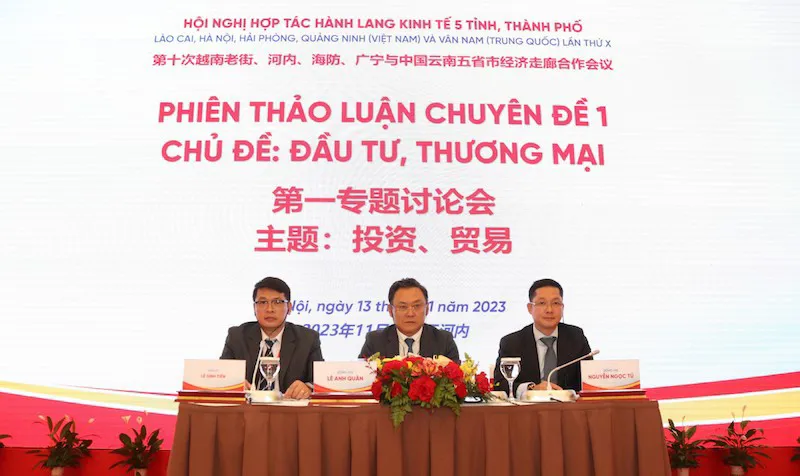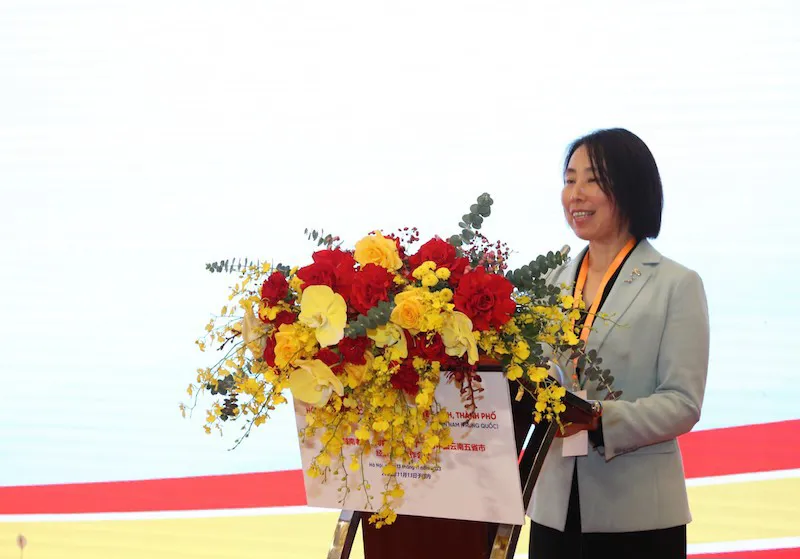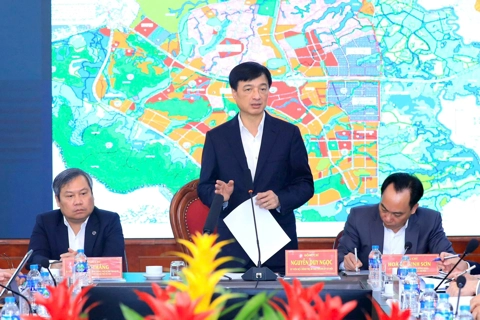Hanoi – an attractive destination for Chinese investors
Hanoi recognizes the importance of the business community, especially the FDI sector, as a crucial driving force for the city's development and integration.
Hanoi remains an attractive destination for foreign investors, including those from China, Vice Director of the Hanoi Department of Planning and Investment Nguyen Ngoc Tu said at a discussion session on trade and investment at the 10th Vietnam-China Economic Corridor Cooperation held today [November 13] in Hanoi.
| Overview of the session. Photos: Thanh Hai/The Hanoi Times |
Tu noted that since the enactment of the Foreign Investment Law, Hanoi and the country have garnered significant attention from foreign investors, with Hanoi consistently asserting its leading position in attracting and utilizing foreign investment capital.
“The city's success is attributed to its continuous enhancements in the investment and business environment, increasingly streamlined legal procedures, and unique advantages,” Tu said.
From 1986 to date, China's Foreign Direct Investment (FDI) influx into Hanoi has exceeded $11.3 billion. This includes 693 new projects with a total registered capital of $415.5 million, 107 projects with increased capital amounting to $135.7 million, and 822 capital contributions and share purchases worth $10.7 billion.
China ranks second among the major countries investing in Hanoi. In the first 10 months of 2023 alone, Hanoi attracted $29.6 million in FDI capital from China.
As Vietnam embraces a period of extensive international integration with various intertwined opportunities and challenges, he added that Hanoi recognizes the business community's importance, especially the FDI sector, as a crucial driving force for the city's development and integration.
| A representative of the Yunnan Department of Commerce. |
Speaking on the direction of infrastructure development in the economic corridor encompassing five provinces and cities of Vietnam and China, Tu highlighted the significance of the Kunming (Yunnan) - Lao Cai - Hanoi - Haiphong - Quang Ninh corridor.
This corridor connects the northern Midlands and Mountains region with major economic centers such as Hanoi, Haiphong, and Quang Ninh, and serves as the region’s shortest link to the sea. It plays a pivotal role in developing the northern region and fostering international cooperation with Yunnan province and the southwestern provinces of China. It also serves as a gateway to the ASEAN region with China, he continued.
In line with the national master plan for the period 2021-2023 and the vision up to 2050, the economic corridor development plan emphasizes the creation of a comprehensive transportation network, including roads and railways. This network aims to ensure connectivity from the Lao Cai border gate to localities along the route, ultimately linking to seaport cluster No.1, including the Lach Huyen gateway port in Haiphong.
The plan also prioritizes the construction of new railway lines connecting Lao Cai, Hanoi, and Haiphong.
According to Tu, a key goal is to promote cooperation among localities along the economic corridor and to leverage and expand trade relations between Vietnam and China, focusing on Yunnan and the southwestern provinces of China.
The plan includes the rational development of the urban system along the corridor to facilitate population distribution and tap into the potential for industrial, agricultural, and forestry development.
"It also aims to establish tourist routes that combine mountain resort tourism with sea travel and to develop digital infrastructure, creating a data center to maintain regional connectivity," he said.
A strategic focus is on the development of synchronized and modern urban and connectivity infrastructure, with an emphasis on the axes connecting Hanoi to major metropolitan areas in the region, Ring Roads No.4 and 5 of the Hanoi Capital Region, and urban and eastern belt railways in Hanoi.
"This approach aims to enhance connectivity and spur socio-economic development throughout the northern region. Industrial, urban, and service belts are also envisioned along Ring Roads No.4 and 5 of the Hanoi Capital Region," he added.
Le Hong Giang, Deputy Director of the Department of Industry and Trade of Quang Ninh expressed the importance of further improving cooperation between Quang Ninh and Yunnan.
He emphasized the need for continued collaboration to enhance trade and logistics efficiency. Quang Ninh aims to invest in modern and synchronized transport infrastructure, including an expressway system connecting Mong Cai, Ha Long, Haiphong, Hanoi, and Lao Cai. This infrastructure development is crucial to promoting efficient freight transport links between Quang Ninh, other provinces and cities in Vietnam, ASEAN countries, and China, he said.
Speaking about Vietnam's investment attraction policy, a representative from the Local Financial Supervision Administration Department of Yunnan province highlighted the advantages, particularly for the country’s manufacturing industry, and the appeal of a young and increasingly qualified labor force.
Many Chinese localities and businesses view Vietnam as a significant destination for investment cooperation under the Belt and Road Initiative, RCEP, and China-Europe railway transport. Notably, two major Chinese corporations plan substantial investments in new lithium battery and energy storage production projects, totaling up to US$1 billion, he said.
Promoting cross-border trade
The Chinese representative expressed his hope for increased Vietnamese exports to China, balancing trade and opening doors for various agricultural products, leveraging agreements such as the China-ASEAN free trade and RCEP agreements. With a market of nearly 100 million people, Vietnam has become an attractive destination for Chinese businesses to invest and explore.
A representative from the Department of Commerce of Yunnan highlighted the continuous strengthening of exchanges and cooperation with relevant Vietnamese departments, branches, and localities.
Chinese customs statistics indicate that in the first nine months of 2023, the import and export turnover between Yunnan and Vietnam reached $1.88 billion, with Yunnan importing $730 million from Vietnam—an increase of 74.8% over the same period last year.
She emphasized that 2023 marks the 10th anniversary of the "Belt and Road" initiative and is an important year for implementing cooperation agreements. The economic and trade cooperation between Yunnan and Vietnam is steadily growing, focusing on mutually beneficial relationships and expanding cooperation in areas of common advantage.
Tran Thi Phuong Lan, Acting Director of the Hanoi Department of Industry and Trade, highlighted the effective implementation of regional linkages. This includes connecting the supply and demand of goods between Hanoi and provinces and cities nationwide and participating in trade activities, fairs, and exhibitions to promote the consumption of various products.
“Hanoi is actively engaged in trade with businesses in Yunnan, and efforts are made to further explore the potential of bilateral trade,” Lan said.
Meanwhile, China's Yunnan Department of Commerce emphasized the untapped potential of bilateral trade between Yunnan and Vietnam, encouraging both sides to support the development of various industries and resolve challenges at border trade points.
In addition, there is a push to foster the growth of cross-border e-commerce. This involves reinforcing the exchange of policies, sharing experiences on cross-border e-commerce and maximizing the utilization of the China-ASEAN Cross-border E-commerce Logistics Industrial Park (Hekou).
Collaboration is sought between e-commerce platforms, overseas warehouses, and other enterprises, with concerted efforts to enhance talent training in cross-border e-commerce.














